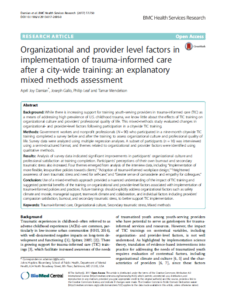
While there is increasing support for training youth-serving providers in trauma-informed care (TIC) as a means of addressing high prevalence of U.S. childhood trauma, we know little about the effects of TIC training on organizational culture and providers’ professional quality of life. This article analyzed the impact of a city-wide trauma-informed training on organizational culture and professional quality of life in government and nonprofit professionals. It found that to better support TIC implementation, trainings should explicitly address organizational factors such as safety climate and morale, managerial support, teamwork climate and collaboration, and individual factors including providers’ compassion satisfaction, burnout, and secondary traumatic stress.